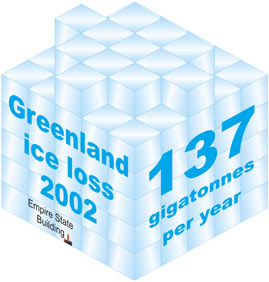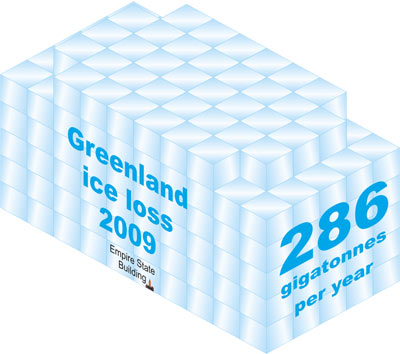A visual depiction of how much ice Greenland is losing
Posted on 27 April 2010 by John Cook
I'm talking at the University of Queensland next week so I thought I might use Skeptical Science to test-drive a new visual metaphor. Sometimes in the climate debate, we get a bit lost in the data and statistical analysis, forgetting the sheer scale of the impact we're having on our climate. A vivid example is the amount of ice that Greenland is currently losing. When scientists talk about ice loss from the Greenland ice sheet, they refer to gigatonnes of ice. One gigatonne is one billion tonnes. To get a picture of how large this is, imagine a block of ice one kilometre high by one kilometer wide by one kilometre deep (okay, the edges are actually 1055 metres long as ice is slightly less dense than water but you get the idea). Borrowing from alien invasion movies, the scale is well illustrated by comparing a gigatonne block of ice to a famous, historical landmark like the Empire State Building:

How much ice is Greenland losing? This is monitored by satellites which have measured changes in gravity around the ice sheet over the last decade (Velicogna 2009). In 2002 to 2003, the Greenland ice sheet was losing mass at a rate of 137 gigatonnes per year.

However, the rate of ice loss has more than doubled in less than a decade. The rate of ice loss over the 2008 to 2009 period was 286 gigatonnes per year.

This is a vivid reminder that global warming isn't a statistical abstraction cooked up in a climate lab. Greenland is just one example of the physical realities of climate change. On the other side of the planet, Antarctica is also losing ice at an accelerating rate. All over the globe, glaciers are retreating at an accelerating rate.
It's also a reminder of the massive amount of inertia at play in our climate. It takes time for the massive Greenland ice sheet to respond to warming. But this inertia is not our friend. Now that Greenland is losing ice at an accelerating rate, it's not like we can throw a rope around the ice sheet and hold it back. The steadily accelerating ice loss from Greenland is an ominous reminder that our actions now will have effects long into the future.































 Arguments
Arguments































Are you Brisbane based? I'm picturing you devising a whopper of a question to ask me.